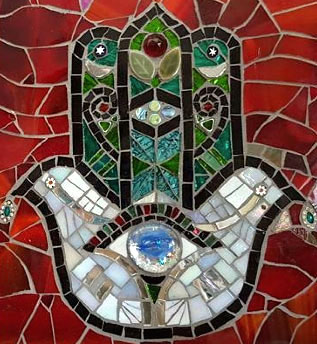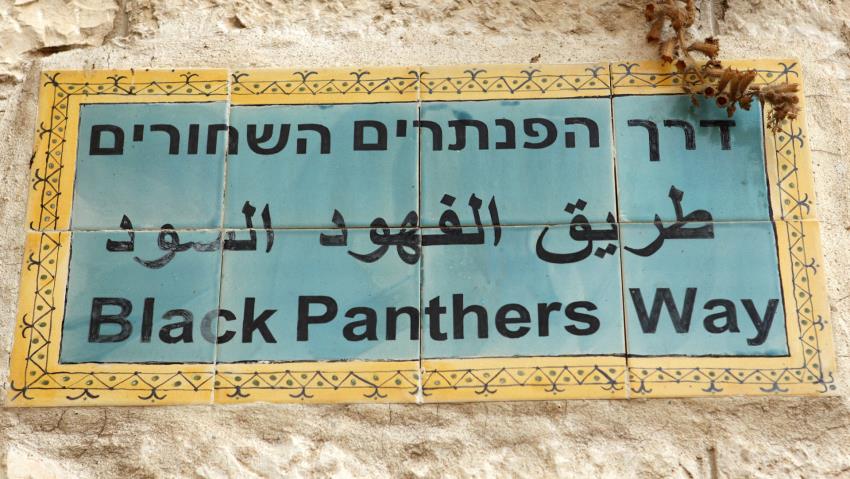Haggadah by Reuven Abergel
English translation by Itamar Haritan
In 1971, members of the Israeli Black Panthers, a group inspired by the US Black Panther Party and organizing against anti-Mizrahi racism in Israel, created the following Haggadah to share their struggle. Traditionally a Haggadah is a guide which helps participants tell the story of Passover during a Seder, usually through symbolic food, blessings, stories, prayer, and song. Each segment of the Israeli Black Panthers Haggadah adapts a common element of the Passover Seder to address the harsh social reality of Mizrahi life in Israel.
Part political satire, part call to freedom, the Israeli Black Panthers Haggadah took Israel’s Labor government to task for its abandonment of Mizrahi communities and protested the systematic erasure of their cultures under Zionism. Replacing Egypt– the traditional site of Jewish bondage in the Passover story– with Israel, the Panthers Haggadah questioned the popular image of Israel as a home for all Jews, and highlighted a reality of racist exclusion against Mizrahi communities.
The Haggadah was thought lost in a 1972 fire at the Black Panthers’ headquarters, but decades later a collector came forward after finding it in his archives. In 2019 it was re-released through a new archive on Mizrahi social struggle in Israel, a project created by activist Sapir Sluzker Amran to resist the lack of public access to information on the community’s history of organizing. Proceeds from the sale of the Haggadah benefit Amram, an organization seeking justice for Mizrahi families whose children were systematically kidnapped by Israeli social services organizations in the 1950s and 60s.
Last week former Israeli Black Panther leader and Haggadah co-author Reuven Abergel held an event sharing the re-issued Haggadah with the community at Cafe Albi in South Tel Aviv. In addition to his struggle with the Panthers, Reuven has spent decades fighting for the rights of Palestinians, Ethiopian Israelis, African asylum seekers, and many others.
Unruly is honored to share this English translation of the Israeli Black Panthers Haggadah so that international audiences can continue to learn from the Panthers’ struggle. Each Hebrew page of the Haggadah is presented with English translation in the caption below.
For more on the Israeli Black Panthers Haggadah please see this article by Mizrahi historian, Asaf Shalev.
A previous version of this post was published with a different translation; it has now been updated with the correct translation by Itamar Haritan.
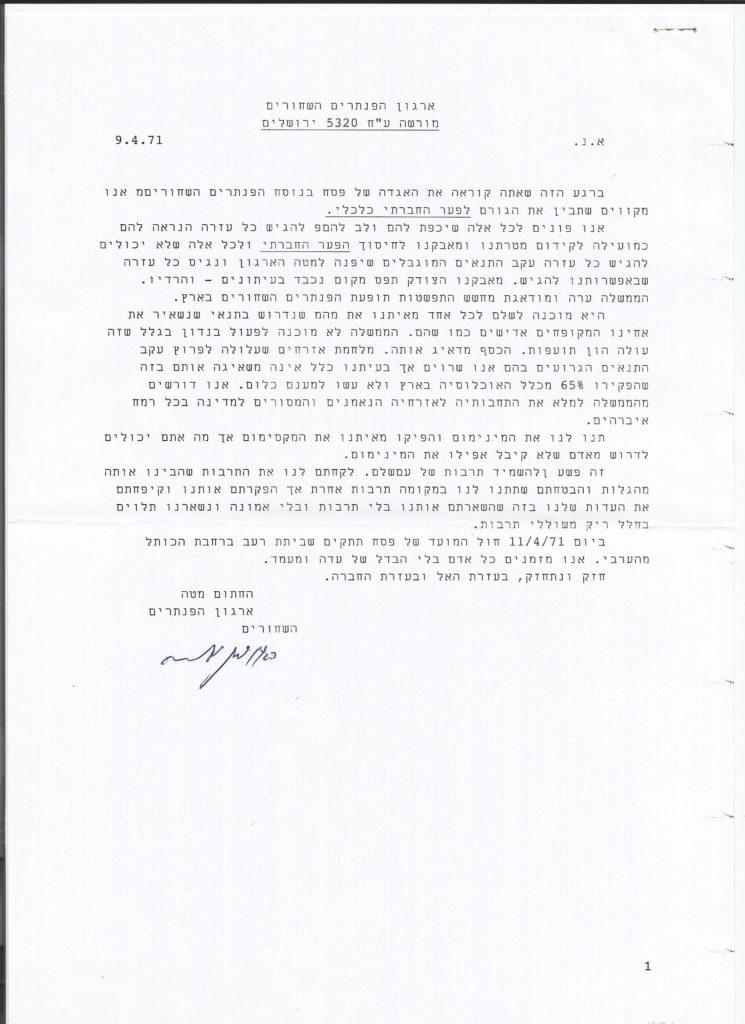
To whom it may concern,
The Black Panthers Organization
Morasha A”yin H”et 5320 Jerusalem
9.4.71
At this very moment, as read the Black Panthers version [1] of the Passover Hagadah, we hope that you will come to understand the reason for the socioeconomic gap.
We turn to all of those who care and have heart, to ask to provide any assistance that they believe would help advance our goal and our struggle to eliminate the social gap, and to all those who cannot afford to offer any help due to their circumstances, turn to the organization headquarters and we will help you in any way we can. Our just struggle has received a place of honor in the newspapers – and the radio. The government is aware and concerned, fearing that the Black Panther phenomenon will spread throughout the country.
They are willing to pay each one of us whatever is required on condition that we leave our oppressed brothers alone to their indifference, just the way they are. The government [says that it] is not willing to take action on this matter because it costs a fortune. Money concerns them. A civil war might erupt as a result of the horrible conditions that we live in, but our problem does not concern them, the fact that they abandoned 65% of the country’s population and did nothing for them. We demand from the government that they fulfill their commitments to their loyal citizens, who are fully and completely dedicated to the state.
If you would give us the minimum, you would get the maximum from us but what can you ask from a person who hasn’t even gotten the minimum.
It is a crime to decimate an entire people’s culture. You took away from us the culture that we brought from the diaspora and you promised us that you would give us a different culture in its place, but you abandoned us and oppressed our ethnic groups and so have left us without culture and without faith and we were left suspended in an empty space, bereft of culture.
On 11/4/71 Chol HaMoed Pesah there will be a hunger strike at the Western Wall plaza. We invite every person regardless of ethnicity and class. We are strong and will grow stronger [2], with God’s help and society’s help.
Signed,
The Black Panthers Organization
(Reuven Abergel)
_______________________________________________________________________________________
1 The Hebrew word נוסח, or nusach, is used.
2 It says חזק ונתחזק, Hazak V’Nithazek, a paraphrase of Hazak Hazak V’Nithazek, which is the blessing said whenever a book of the Torah is concluded.
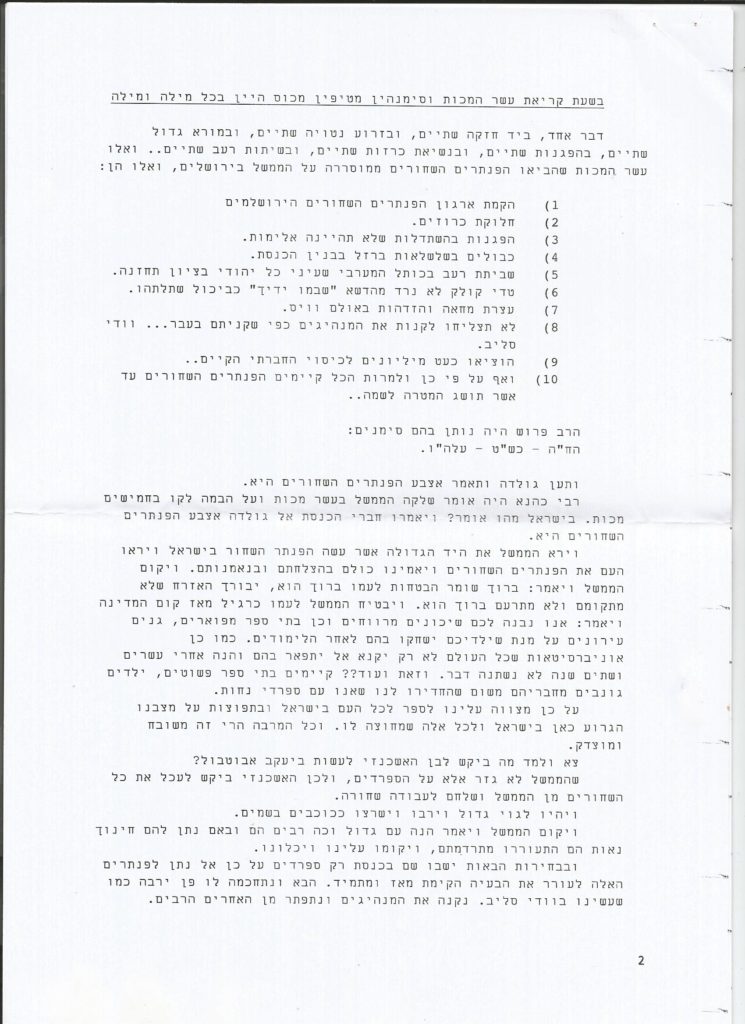
At the Time of Reading of the Ten Plagues and the Marking of Them, Drops of Wine are Spilled from the Glass for Each Word
Another interpretation is, “with a strong hand” means two plagues, “with an outstretched arm” means two plagues, and “with great awe” means two plagues, and “protests” means two plagues, and “carrying signs” means two plagues, and “hunger strikes” means two plagues… and these are the ten plagues [3] that the Black Panthers brought from Musrara upon the government in Jerusalem, and they are:
1) Establishing the Jerusalemite Black Panther Organization
2) Distributing flyers.
3) Protests that we try as best we can for them not to become violent.
4) Chaining ourselves to the Knesset building with iron chains.
5) Hunger striking at the Western Wall so that every Jew in Zion would see.
6) Teddy Kollek, we won’t get off the lawn that you supposedly planted “with your own
two hands.” [4]
7) Protest and solidarity vigil in Weiss Hall. [5]
8) You will not be able to buy off the leaders like you were able to in the past… Wadi Salib.
9) They have been spending millions to try [to calm the Black Panthers down] to deal with
the existing social situation.
10) And in spite of it all and against all odds, the Black Panthers will exist until our goal is
achieved…
Rabbi Forush [6] would give them this acronym: EDP CHTP YTA
And Golda would answer and say “This is the Black Panthers’ doing.” [7]
Rabbi Kahana [8] said that the government was struck by ten plagues, but it was as if it was struck by fifty plagues in the eyes of the public. And what would he say if he were in Israel?
And the Knesset Members said to Golda “This is the Black Panthers’ doing.”
And the government saw the great hand that the Black Panther has raised in Israel, and the people saw the Black Panthers and they all believed in their success and dedication. And the government rose and said: Blessed is the keeper of promises to his people, who is blessed to his people, blessed is the citizen who does not rise up and does not become angry. And the government will make a promise to its people, as it has consistently done since the establishment of the state, and they will say: We will build you spacious housing projects as well as magnificent schools, city parks for your children to play in after school. Likewise universities that the entire world will not only envy but also praise, and here after twenty two years nothing has changed. And what’s more?? The existing schools are bare bones, children steal from their friends because they made us believe that we are an inferior Sephardic people.
That is why we are commanded to tell the whole of the Jewish people in Israel and in the diaspora about our horrible condition here in Israel, as well as to the entire world. And the more you tell, the better and more just.
Go and learn what the white Ashkenazi wanted to do to Yaakov Abutbul? [9]
He wanted to pass the following sentence on the Sephardim and only on them, to uproot all the black people from the establishment [10] and to sentence them to a life of black
labor.
And they became a great nation and multiplied and swarmed [to become as numerous
as] the stars in the sky.
And the government rose and said “Here is such a great nation and so numerous and if
we give them good education they will awaken from their slumber, and will rise against us and defeat us.
And in the next elections only Sephardis will sit there in the Knesset, therefore do not allow these Panthers to raise the problem that has existed all along. Let us outsmart them lest they multiply, as we did in Wadi Salib. Let us buy their leaders and be rid of the numerous others.”
_________________________________________________________________________________________________
3 The text counts twelve plagues, not ten. Reuven Abergel explains that this text was written by him and a few others who were only kids, busy with survival, lacking in education or political consciousness, and this oversight should be viewed as a strong testament to this fact.
4 The first Black Panthers protest in 1971 was held near the municipality building where Teddy Kollek, then Jerusalem’s mayor, was looking on from his balcony. According to people present, he told them “punks, get off the lawn.” This statement is almost as memorable to the Black Panthers as Golda’s “they are not nice.” It encapsulates the contempt that Kollek had towards Mizrahim in general and the Black Panthers in particular, which is reflected in him acting as if the lawn is “his” and as if “he planted it himself.” This is what the Panthers are referring to.
5 Left-wing Ashkenazi students in Hebrew University did an event in honor of the Black Panthers and filled the largest university hall, Weiss Hall. They invited Charlie Biton, Reuven Abergel and Sa’adia Marciano. That was the first time that they had ever been at a university campus. This was embarrassing for the government, because the newspapers reported that the hall was filled to overflow even more than an earlier event featuring Milton Friedman and Henry Kissinger.
6 Rabbi Forush was in charge of welfare in the Jerusalem municipality. He was responsible for suppressing the Mizrahi protests in the neighborhoods. He was also vice mayor. He would constantly denigrate the Black Panthers.
7 In the usual Haggadah story, the Pharaoh’s magicians say of Moses that he is “this is God’s doing” after the plagues strike, meaning that the plagues are God’s doing. The Black Panthers are referring to this moment in Exodus.
8 Rabbi Meir Kahana was a prominent American racist activist and founder of the ultra right-wing “Kach” movement in Israel, which was banned from the Knesset for its virulently anti-Arab views. Kahana was an early opponent of the Black Panthers, calling them “anti-Semites” and using the racist epithet “frenkim.” He incited his supporters to attack the Black Panthers, but was met with intense resistance and even had his rallies, meetings and press conferences attacked. In this passage, the Black Panthers are chiding Rabbi Kahana who criticizes them from America, emphasizing the fact that he is a foreign racist imported by Israel to fight against them.
9 A Mizrahi “Joe Shmoe,” a common name intended to stand for all Mizrahim.
10 By “establishment,” the Black Panthers meant many things other than the government. They meant universities, key positions in the labor market, entire tracks of distinct social classes.
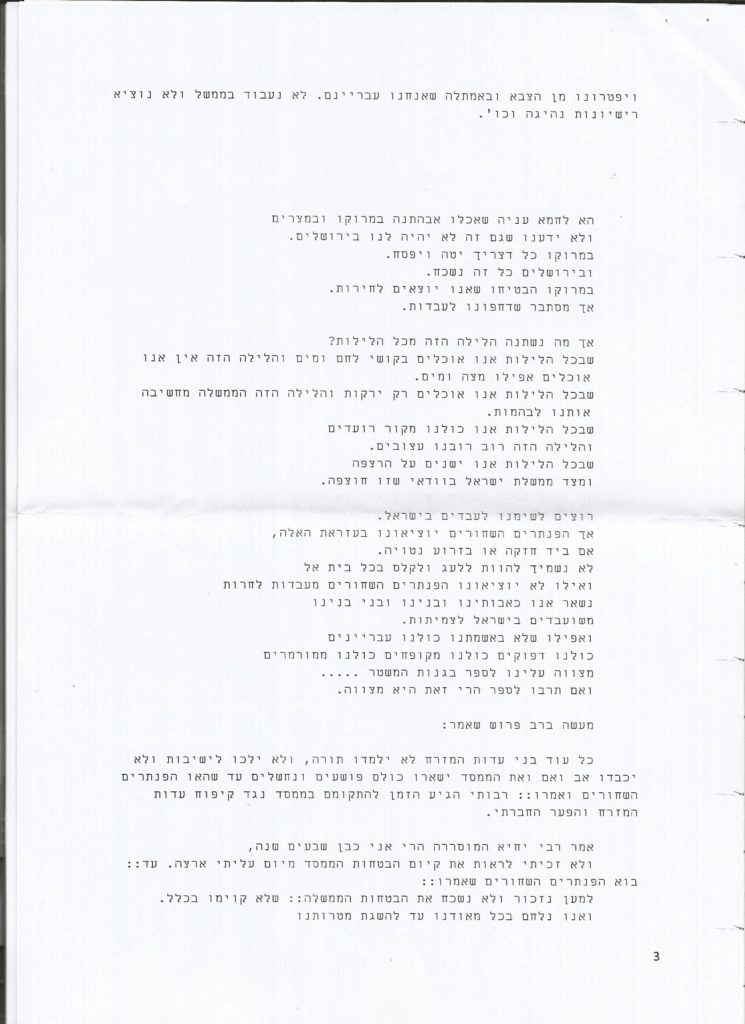
And they will exempt us from the army under the pretense that we are criminals. We [therefore] would not be able to work in the government or get
drivers’ licenses and so on.
הא לחמה עני – Ha Lachma Anya [11]
This is the bread of affliction that we ate in Morocco and Egypt
And we did not know that we wouldn’t even have this in Jerusalem. In Morocco, all who are hungry could come and eat.
In Jerusalem all this was forgotten.
In Morocco they promised us that we will be free.
But it turns out that they forced us into slavery.
Ma Nishtana
So what makes this night different from all other nights?
That every other night we barely eat bread and water and this night we don’t even have matza and water.
That every other night we eat only vegetables and this night the government considers us to be beasts.
That every other night we all shiver from the cold
And this night our sadness is clear for all to behold.
That every other night we sleep on the floor
And this is certainly something that this Israeli government should abhor.
They want to make us slaves in Israel.
But the Black Panthers will take us out with by using the club, Whether with a mighty hand or with an outstretched arm.
We will no longer be ridiculed and mocked in every home
And if the Black Panthers do not take us out of slavery and to freedom We will remain as our fathers and sons and sons’ sons,
Enslaved in Israel forever.
And even though we are all criminals by no fault of our own
We are all messed up, we are all oppressed, we are all bitter
Still we are commanded to tell against the government…..
And the more often that this is told, that is a mitzvah.
A story was told by Rabbi Farosh, who said:
“So long as Middle Eastern Jews do not learn Torah, do not attend yeshivas and do not respect their mother and father and the establishment, they will remain criminals and lag behind.” Until the Black Panthers came and said: “Gentlemen, the time has come to rise up against the establishment, against ethnic oppression of Middle Eastern Jews and against the social gap.”
Rabbi Yehiya HaMusrara’i [12] said, “Here I am seventy years old,
And I have yet to see the establishment fulfill its promises since the day I made Aliyah to Israel.” Until the Black Panthers came and said:
“So that we shall remember and not forget the promises of the government: that were not fulfilled at all.
And we will fight with all our might to achieve our goal.”
________________________________________________________________________________
11 The original Ha Lachma Anya reads like this: This is the bread of affliction that our ancestors ate in the land of Egypt. Let all who are hungry come and eat. Let all who are in need come and celebrate Passover. Now we are here. Next year in the land of Israel. Now we are slaves. Next year we will be free.
12 Yehiya HaMusrara’i (Yehiyah of Musrara) refers to Rabbi Yehiya Schneur, the Musrara community’s rabbi. A Moroccan Jews form the Atlas Mountains, Schneur studied with the Baba Sali himself. His last name raises the possibility that he is one of the few early Polish Jewish immigrants to Morocco who later immigrated to Israel.
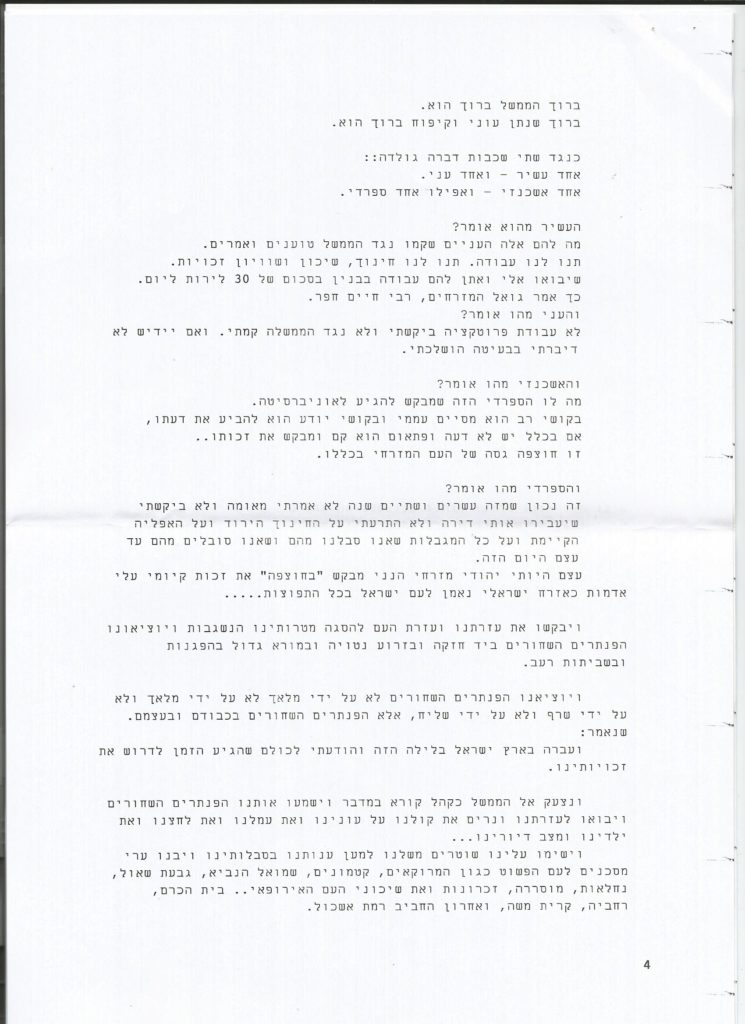
Blessed is the government, blessed be it.
Blessed is the one who gave poverty and oppression, blessed be it.
Golda speaks of two types of class:
One rich – and one poor.
One Ashkenazi – and even one Sephardi. [13]
The rich, what does he say?
“What’s with these poor who rise against the government, what are they arguing and saying? Give us work. Give us education, housing and equal rights. Let them come to me and I will give them work in construction for 30 lira a day.” That is what the redeemer of the Mizrahim, Rabbi Haim Hefer [14], said.
And the poor, what does he say?
“I did not ask for protektzia [15] nor did I rise up against my government. And because I do not speak Yiddish, I am swiftly told off with a kick.”
And the Ashkenazi, what does he say?
“What’s it to this Sephardi to want to go to university?
He barely finishes public school and is hardly able to express himself, if he even has an
opinion, and all of a sudden he rises up to claim his rights…
That is the crude chutzpah of the Mizrahi people as a whole.”
And the Sephardi, what does he say?
“It is true that for twenty two years I did not say a word and did not ask to be moved to an apartment and did not protest the degraded state of education and the existing discrimination and all the restrictions that we have suffered from and that we suffer from to this day.
By virtue of my being a Mizrahi Jew I hereby ask with “chutzpah” for my right to exist on this earth as an Israeli citizen loyal to Jewish people of all ethnicities…..”
And they asked our help and the help of the people to achieve our noble goals, and the Black Panthers took us out with a mighty hand and an outstretched arm and with great awe and with protests and with hunger strikes.
And the Black Panthers took us out not through an angel, not through an angel and not through a seraph and not through a messenger, but rather the Black Panthers did it themselves.
And it came to pass that night and I let everyone know that it is time to demand our rights.
And they cried out to the government as a people calling out in the desert, and the Black Panthers heard us and came to our aid, and we sounded the voices of our crimes and our labor and our oppression and our children and the condition of our housing…
And they placed among us officers of our own for the crimes we commit in our suffering, and cities were built for the miserable simple people like the Moroccans, [like] Katamonim, Shmuel HaNavi, Givat Shaul, Nachlaot, Musrara, Zikhronot, [16] and the housing projects of the European people… Beit HaKerem, Rechavya, Kiryat Moshe, and best for last, Ramat Eshkol.
___________________________________________________________________________________________
13 The great contribution of the Black Panthers to Israeli discourse was to say that Golda Meir’s talk of Ashkenazi and Mizrahi people was actually about rich and poor. The Ashkenazi remain rich and the Mizrahi remain poor.
14 Haim Hefer was a well-known Israeli poet and journalist, one of the Israeli cultural establishment. The Panthers regarded him as a “journalist sellsword,” demonizing the Panthers for money. He is a well-known Israeli poet and journalist. He wrote racist articles calling the Mizrahim lazy and primitive, that they are “crybabies” and that he will give them jobs in construction if they just come to him instead of doing activism. The idea is especially condescending, because many Mizrahi and many panthers, including Reuven Abergel, did work in construction and all their bosses were Ashkenazi.
15 “Protektzia” means basically a favor. If one is given a protektzia, one can go ahead of the line based on a personal relationship with the boss or administrator.
16 Zikhronot is a part of Nakhlaot that used to be extremely poor. It was almost a “favela” of Mizrahi immigrants living in dilapidated stone houses reinforced with corrugated steel, thus earning the name “The Tin Neighborhood” (שכונת הפחים).
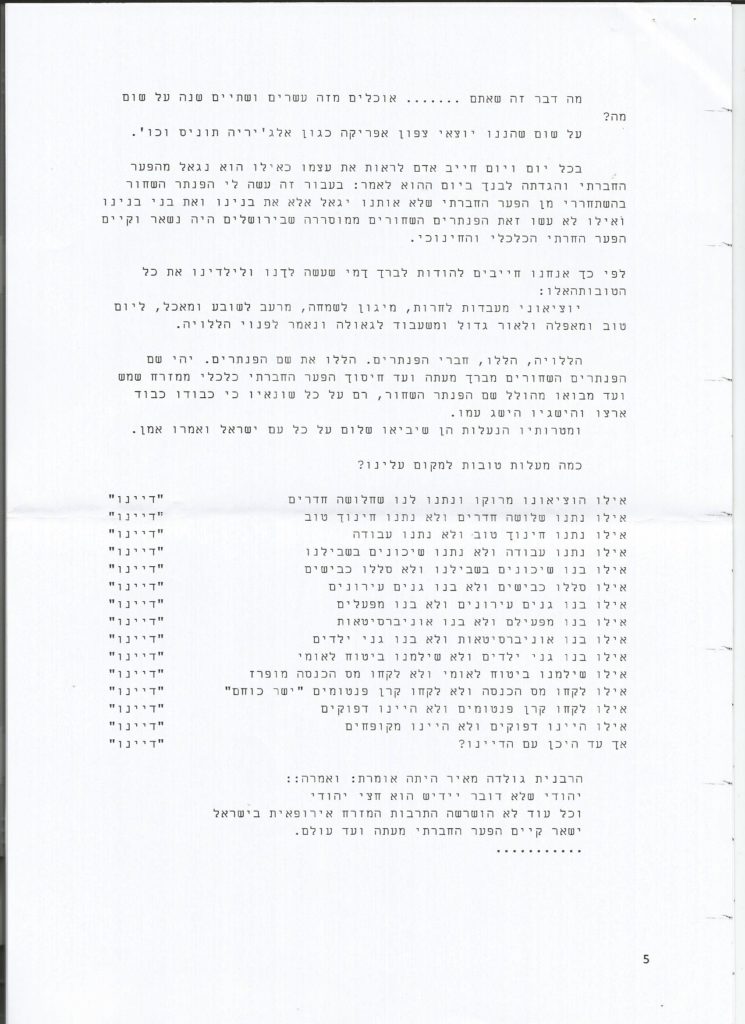
What is this thing that you…….. have been eating for the last twenty two years, and for what?
Because we are immigrants from North Africa, like Algeria, Tunis, etc.
Every single day a person must see themselves as if they were redeemed from the social gap, and you told your son on that day, saying: because of what the Black Panther did for me, I was freed from the social gap, which would not redeem us but our sons and our sons’ sons, and if the Black Panthers of Musrara in Jerusalem had not done so, the social economic and educational gap would have remained in existence.
That is why we must thank and bless those who have done all these favors for us and for our children:
They have taken me from slavery to freedom, from sorrow to joy, from hunger to satiation and food, to a good day, and from darkness to a great light, and from enslavement to redemption, and let us say before him, hallelujah.
Hallelujah, praise be to the members of the Panthers. Praise the name of the Panthers. Let the name of the Black Panthers be blessed from now and until the socioeconomic gap is eliminated, from where the sun rises to where it sets, let the name of the Black Panther be exalted, towering above all his enemies because his honor is the honor of his land and his achievements are his people’s achievements.
And his noble goals will bring peace to all of Israel, and let us say Amen.
Dayenu
How many levels of favors has the Lord bestowed upon us?
If they had taken us out of Morocco and given us three rooms
“Dayenu” [17]
If they had given us three rooms and not given us a good education
“Dayenu”
If they had given us a good education but had not given us work
“Dayenu”
If they had given us work but had not given us housing projects
“Dayenu”
If they had built us housing projects but had not paved roads
“Dayenu”
If they had paved roads and not built city parks
“Dayenu”
If they had built city parks but had not built factories
“Dayenu”
If they had built factories but had not built universities
“Dayenu”
If they had built universities but had not built kindergartens
“Dayenu”
If they had built kindergartens and we had not paid National Insurance fees
“Dayenu”
If we had paid National Insurance fees and they had not collected an excessive income tax “Dayenu”
If they had collected income tax and had not taken our
“Yeshar Kocham” Phantomim Fund [18]
“Dayenu”
If they had taken the Phantomim Fund and we were not messed up
“Dayenu”
If we had been messed up but we were not oppressed
“Dayenu”
But when will this Dayenu end?
“Dayenu”
The rabbi’s wife Golda Meir used to say: and said:
“A Jew who does not speak Yiddish is half a Jew
And so long as Eastern European Jewish culture is not inculcated in Israel
The social gap will exist now and forever.”
…….
_________________________________________________________________________________________________
17 “It would have sufficed us.”
18 Here the Black Panthers are referring to the government’s practice of deducting funds from people’s paychecks for various funds that are involved in the military and waging war. The “Phantom” was a combat airplane that Israel was using at the time, and “Phantomim Funds” are a generic term for such funds. In this case, the Black Panthers named this fictitious Phantomim Fund “Yeshar Kocham” or “Godspeed to Them,” to highlight that the government is deducting funds from the poor to enrich itself.
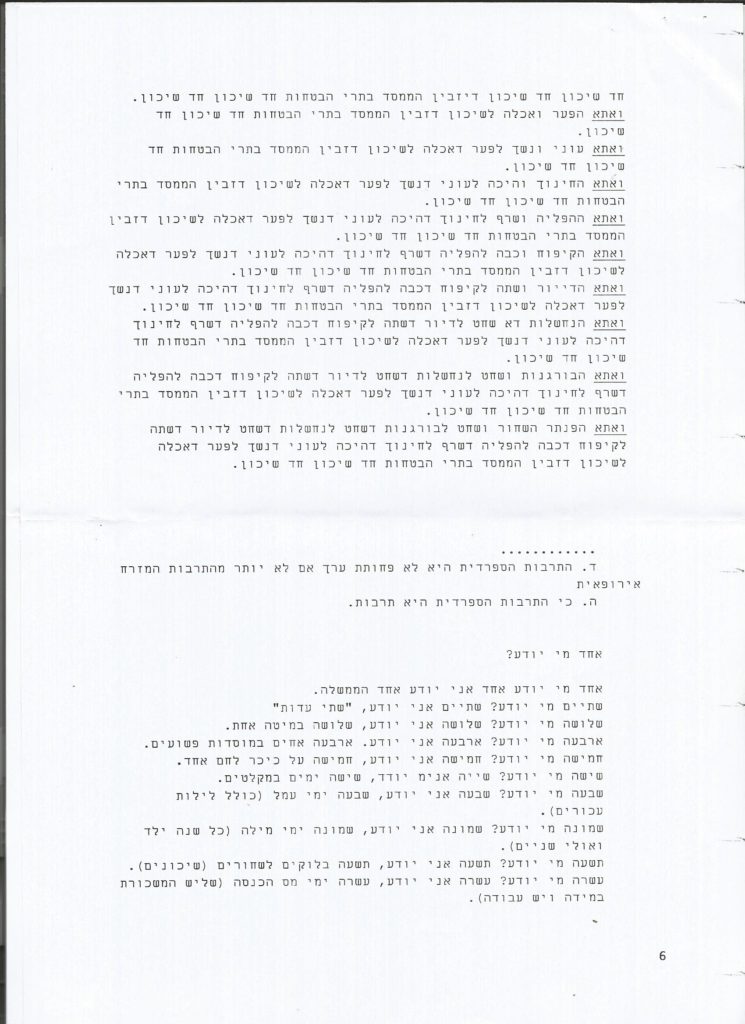
Chad Gadya = Chad Shikun, or “one housing project”
One housing project, one housing project that the establishment paid for with two promises, one housing project, one housing project.
And then came the [socioeconomic] gap and ate up the housing project that the establishment paid for with two promises, one housing project, one housing project.
And then came poverty and bit the gap that ate up the housing project that the establishment paid for with two promises, one housing project, one housing project.
And then came education and struck the poverty that bit the gap that ate up the housing project that the establishment paid for with two promises, one housing project, one housing project.
And then discrimination came and burnt the education that struck the poverty that bit the gap that ate up the housing project that the establishment paid for with two promises, one housing project, one housing project.
And then the oppression extinguished the discrimination that burnt the education that struck the poverty that bit the gap that ate up the housing project that the establishment paid for with two promises, one housing project, one housing project.
And then came the housing and drank up the oppression that extinguished the discrimination that burnt the education that struck the poverty that bit the gap that ate up the housing project that the establishment paid for with two promises, one housing project, one housing project.
And then came the underdevelopment and killed the housing that drank up the oppression that extinguished the discrimination that burnt the education that struck the poverty that bit the gap that ate up the housing project that the establishment paid for with two promises, one housing project, one housing project.
And then came the bourgeoisie and killed the underdevelopment that killed the housing that drank up the oppression that extinguished the discrimination that burnt the education that struck the poverty that bit the gap that ate up the housing project that the establishment paid for with two promises, one housing project, one housing project.
And then came the Black Panther and killed the bourgeoisie that killed the underdevelopment that killed the housing that drank up the oppression that extinguished the discrimination that burnt the education that struck the poverty that bit the gap that ate up the housing project that the establishment paid for with two promises, one housing project, one housing project.
………………………………………………..
D. Sephardic culture is no less valuable, if not more valuable, than Eastern European culture. H. Because Sephardic culture is culture.
One, who knows? (Echad Mi Yodea)
One, who knows? One, I know.
One is the government.
Two, who knows? Two, I know.
“Two ethnic groups.”
Three, who knows? Three, I know.
Three [people having to sleep] in one bed.
Four, one who knows? Four, I know.
Four brothers in juvenile delinquent institutions.
Five, who knows? Five, I know.
Five people for every loaf of bread.
Six, who knows? Six, I know.
Six days in the bomb shelters.
Seven, who knows? Seven, I know.
Seven day work week (including crummy nights)
Eight, who knows? Eight, I know.
Eight days to Brit Milah (every year a child or maybe two).
Nine, who knows? Nine, I know.
Nine blocks for black people (housing projects).
Ten, who knows? Ten, I know.
Ten income tax days (a third of your paycheck, on the condition that you have a job).
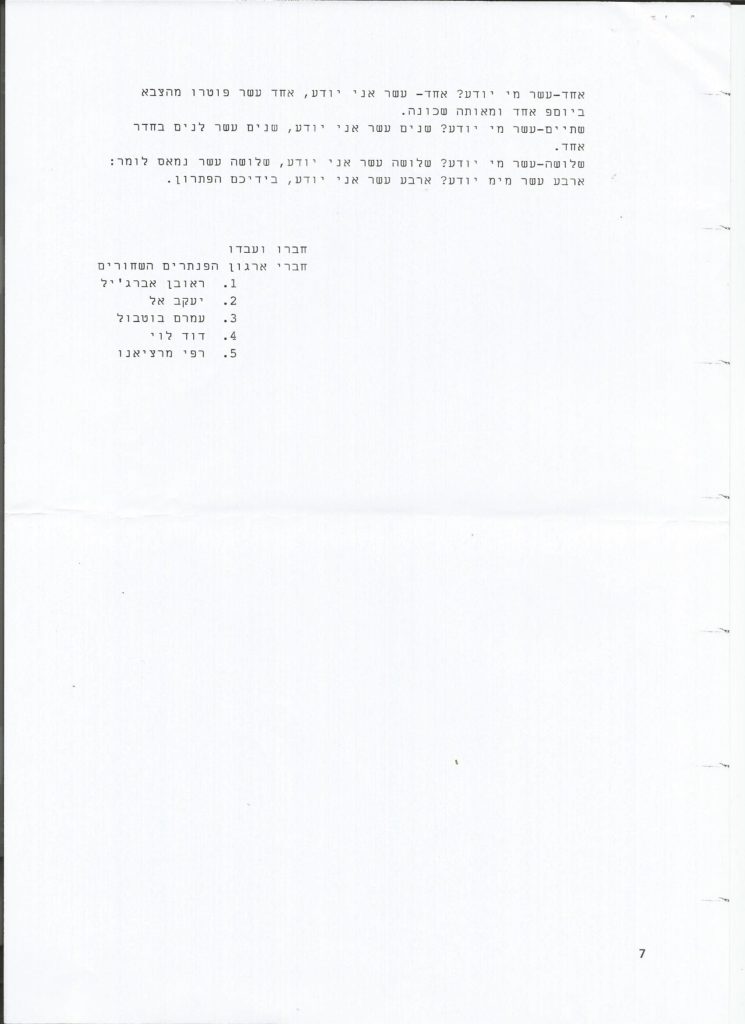
Eleven people fired from the army on one day from the same neighborhood.
Twelve, who knows? Twelve, I know.
Twelve people sleeping in one room.
Thirteen, who knows? Thirteen, I know.
Thirteen, we’re sick of saying this over and over:
Fourteen, who knows? Fourteen, I know.
The solution is in your hands.
Written and produced by:
The Members of the Black Panther Organization
1.Reuven Abergel
2. Yaakov El
3.Amram Butbul
4. David Levi
5. Rafi Marciano
